#PythonforBeginners
Explore tagged Tumblr posts
Text

Master Python with MDIDM INFOWAY! 💻
Are you ready to elevate your coding skills? Join our Python Online Training and gain hands-on experience with expert mentors. Whether you're a beginner or looking to refine your skills, our industry-focused curriculum has got you covered!
What You'll Get: Comprehensive Course Curriculum Training by Experienced Industry Professionals Hands-on Practical Learning Lab Facility with Expert Mentors
📞 Contact us to Enrol now! 📲 +91 83471 93531
PythonTraining
#LearnPython#PythonForBeginners#PythonDevelopment#MDIDMInfoway#OnlineLearning#CodingSkills#PythonProgrammer
2 notes
·
View notes
Text
Top Free Python Courses & Tutorials Online Training | NareshIT
Top Free Python Courses & Tutorials Online Training | NareshIT
In today’s tech-driven world, Python has emerged as one of the most versatile and popular programming languages. Whether you're a beginner or an experienced developer, learning Python opens doors to exciting opportunities in web development, data science, machine learning, and much more.
At NareshIT, we understand the importance of providing quality education. That’s why we offer free Python courses and tutorials to help you kick-start or advance your programming career. With expert instructors, hands-on training, and project-based learning, our Python online training ensures that you not only grasp the fundamentals but also gain real-world coding experience.
Why Choose NareshIT for Python Training?
Comprehensive Curriculum: We cover everything from Python basics to advanced concepts such as object-oriented programming, data structures, and frameworks like Django and Flask.
Expert Instructors: Our team of experienced instructors ensures that you receive the best guidance, whether you're learning Python from scratch or brushing up on advanced topics.
Project-Based Learning: Our free tutorials are not just theoretical; they are packed with real-life projects and assignments that make learning engaging and practical.
Flexible Learning: With our online format, you can access Python tutorials and training anytime, anywhere, and learn at your own pace.
Key Features of NareshIT Python Courses
Free Python Basics Tutorials: Get started with our easy-to-follow Python tutorials designed for beginners.
Advanced Python Concepts: Dive deeper into topics like file handling, exception handling, and working with APIs.
Hands-on Practice: Learn through live coding sessions, exercises, and project work.
Certification: Upon completion of the course, earn a certificate that adds value to your resume.
Who Can Benefit from Our Python Courses?
Students looking to gain a solid foundation in programming.
Professionals aiming to switch to a career in tech or data science.
Developers wanting to enhance their Python skills and explore new opportunities.
Enthusiasts who are passionate about learning a new skill.
Start Learning Python for Free
At NareshIT, we are committed to providing accessible education for everyone. That’s why our free Python courses are available online for anyone eager to learn. Whether you want to build your first Python program or become a pro at developing Python applications, we’ve got you covered.
Ready to Dive into Python?
Sign up for our free Python tutorials today and embark on your programming journey with NareshIT. With our structured courses and expert-led training, mastering Python has never been easier. Get started now, and unlock the door to a world of opportunities!
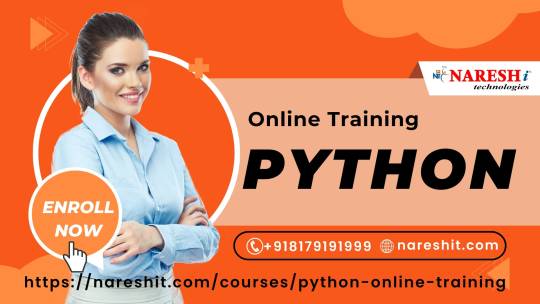
#python#pythontraining#freepythoncourse#onlinetraining#coding#pythontutorials#pythonforbeginners#programming#pythononline#learnpython#softwaretraining#freelearning#pythonprogramming#onlinetutorial#techtraining#pythoncourses#onlineeducation#pythoncode#codingforbeginners
2 notes
·
View notes
Text
Studying code calmly and avoiding a burnout. Day 2
(27/06/2023)
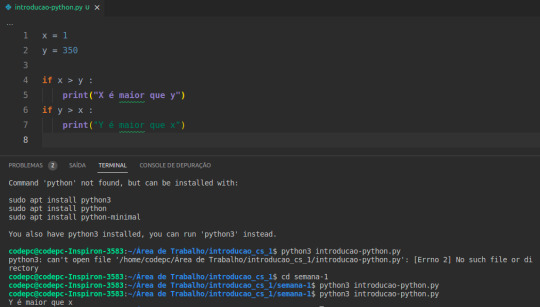
Hello everyone.
How are you? I hope well.
Today I continued my saga of studying calmly avoiding a burnout (it's serious but it's funny at the same time kkkkkk)
I finished module 1 of javascript and did well in the logic exercises.
And here I've been reflecting and comparing myself a lot with the June 2022 bea, she couldn't do a logic exercise and today I've mastered it well. Sometimes I get choked up. But I can always work it out if I really try.
I installed python 3.11 and here was another overcoming because as I have the linux terminal (I will never recommend it for beginners) I kept having to install and update the version. But today I got it.
(This exercise was to only test my terminal in vscode)
Hey, you must ask yourself, but why python if you have a front-end?
Because I need to learn function and ordering algorithms and I find it easier with python than with javascript. (precisely because I know more about python than js)
With this I started my introductory computer science course and I hope to finish it by Thursday. And how are your studies?
I wish you can overcome your obstacles to achieve your goals, discipline, constancy.
And my personal advice, when my goals aren't enough to motivate me, I decide to win in the power of hate.
Recommend, anger is good if you use it responsibly and intelligently. UEUEHHEUEEU. Drink water.
#womanintech#codeblr#software development#woman in stem#studyblog#coding#studyblr#software engineering#code#algorithms#study with me#study hard#studyblr community#college studyblr#studywithme#studyspo#pythonforbeginners#python#pythoncode#pythonprogramming#programmer#coder#developer#javascript
35 notes
·
View notes
Text
Functions vs. Methods in Python: What's the Difference?
When starting your Python journey, you’ll often hear about functions and methods. They may seem similar, but they have important differences that every beginner should understand. Let’s break it down in a simple way — no coding required.
📘 What Are Functions?
A function in Python is a reusable block of code that performs a specific task. You create it once and use it as many times as needed. Functions work independently — they don’t belong to any object. You just call them by their name and pass the required data, called arguments.
Example in real life: Think of a function like a calculator. You give it numbers (input), press a button (call the function), and get a result (output).
📗 What Are Methods?
A method is also a block of code that performs a task, but it’s tied to a specific object. That means it works on the data that the object contains. In simpler terms, a method is a function that belongs to something — like a list, a string, or a custom object.
Example in real life: Imagine you have a TV remote. The buttons (methods) work only for your TV (object). You can’t use the same buttons on your fridge.
🧠 Key Differences
Functions are standalone, while methods are tied to objects.
You use functions for general tasks, and methods to perform actions specific to the type of data (like modifying a list or changing text).
Functions don’t know anything about the object’s data unless you explicitly give it, but methods automatically access the object’s data.
🤔 Why This Matters
Understanding this difference helps you read, write, and debug Python code more effectively. It also prepares you for deeper topics like object-oriented programming, where methods are used extensively.
🆘 Need Help Learning Python?
Whether you’re just starting out or feeling stuck with Python basics, visit AllHomeworkAssignments.com. Our experts offer personalized tutoring, assignment help, and hands-on support to make learning Python stress-free.
#PythonForBeginners#FunctionsVsMethods#LearnPython2025#AllHomeworkAssignments#PythonHelp#PythonBasicsExplained#ProgrammingMadeEasy
0 notes
Text
Top Python Interview Questions and Answers to Crack Your Next Tech Interview
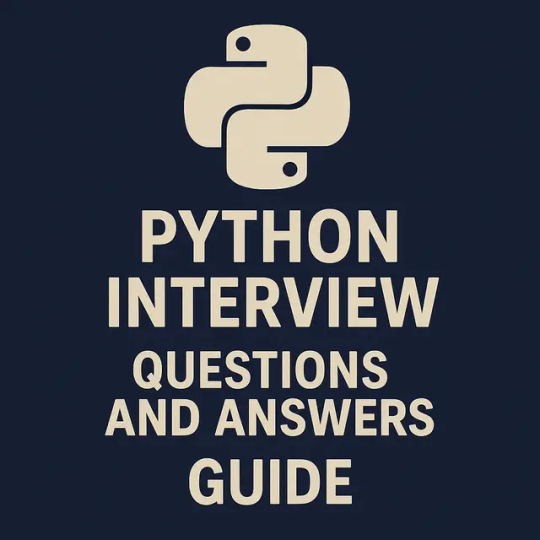
Python is one of the most in-demand programming languages for developers, data scientists, automation engineers, and AI specialists. If you're preparing for a Python-based role, reviewing commonly asked Python interview questions and answers is a smart move.
This blog covers essential questions and sample answers to help you prepare for technical interviews at both beginner and advanced levels.
📘 Looking for the full list of expert-level Q&A? 👉 Visit: Python Interview Questions and Answers – Freshy Blog
🔹 Basic Python Interview Questions and Answers
1. What is Python?
Python is an interpreted, high-level programming language known for its simplicity and readability. It supports multiple programming paradigms including OOP, functional, and procedural styles.
2. What are Python's key features?
Easy-to-read syntax
Large standard library
Open-source and community-driven
Supports object-oriented and functional programming
Platform-independent
3. What are Python lists and tuples?
List: Mutable, allows changes
Tuple: Immutable, used for fixed collections
🔸 Intermediate Python Interview Questions and Answers
4. What is a dictionary in Python?
A dictionary is an unordered collection of key-value pairs. It allows fast lookups.
my_dict = {"name": "Alice", "age": 30}
5. What is a Python decorator?
A decorator is a function that takes another function and extends its behavior without explicitly modifying it.
def decorator(func):
def wrapper():
print("Before")
func()
print("After")
return wrapper
🔹 Advanced Python Interview Questions and Answers
6. What is the difference between deep copy and shallow copy?
Shallow Copy: Copies the outer object; inner objects are still referenced.
Deep Copy: Copies all nested objects recursively.
7. Explain Python's Global Interpreter Lock (GIL).
GIL is a mutex that protects access to Python objects, preventing multiple threads from executing Python bytecode simultaneously in CPython.
🔍 More Covered in the Full Guide:
Exception handling and custom exceptions
Lambda functions and map/filter/reduce
File handling in Python
List comprehension vs generator expressions
Python 3.x updates and syntax changes
📘 Read them all in this full-length guide: 👉 https://www.freshyblog.com/python-interview-questions-and-answers/
✅ Tips to Crack Python Interviews
Practice writing code daily
Review OOP, exception handling, file I/O
Solve Python problems on LeetCode or HackerRank
Be prepared to explain your logic step-by-step
Final Thoughts
Whether you're a beginner or aiming for a senior developer position, reviewing these Python interview questions and answers will boost your confidence and interview performance.
🔗 Explore the full list with real-world examples and pro tips: 👉 https://www.freshyblog.com/python-interview-questions-and-answers/
#PythonInterviewQuestionsAndAnswers#PythonForBeginners#TechInterviewPrep#PythonJobs2025#LearnPython#BackendDeveloper#FreshyBlog#PythonTips#CrackTheInterview#CodingInterviewQuestions#pyhon
0 notes
Text

🎓 Student Testimonial I really enjoyed this course The subjects were useful and matched real-world jobs The teachers explained things clearly I learned about data coding and tools like Python and SQL Projects helped me practice what I learned It was hard sometimes, but worth it I feel ready for a data job now.
✅ Why Choose Us?
✔️ 100% practical training
✔️ Real-time projects & case studies
✔️ Expert mentors with industry experience
✔️ Certification & job assistance
✔️ Easy-to-understand Telugu + English mix classes
📍 Institute Address:
3rd Floor, Dr. Atmaram Estates, Metro Pillar No. A690, Beside Siri Pearls & Jewellery, near JNTU Metro Station, Hyder Nagar, Vasantha Nagar, Hyderabad, Telangana – 500072 📞 Contact: +91 9948801222 📧 Email: [email protected] 🌐 Website: https://dataanalyticsmasters.in
#StudentTestimonial#DataAnalyticsCourse#LearnDataAnalytics#PythonForBeginners#SQLTraining#JobReadySkills#CareerInTech#WomenInTech#TechEducation#OnlineLearning#SkillDevelopment#DataAnalyticsTraining#DataJobsIndia#DigitalCareers#DataAnalyticsMasters
0 notes
Text
How To Use Pandas For Analysis?
Pandas is a powerful Python library used for data manipulation and analysis. It provides two primary data structures: Series (one-dimensional) and DataFrame (two-dimensional), which are essential for handling structured data. To start using Pandas, first import it using import pandas as pd. You can then load data from various sources such as CSV, Excel, or SQL databases using functions like pd.read_csv() or pd.read_excel().
Once your data is loaded into a DataFrame, you can explore it with methods like .head(), .info(), and .describe() to get a quick summary. Cleaning data involves handling missing values (.dropna(), .fillna()), renaming columns, or changing data types. For analysis, you can use filtering (df[df['column'] > value]), grouping (.groupby()), and aggregation functions (.mean(), .sum(), .count()). Visualization libraries like Matplotlib or Seaborn can be used alongside Pandas to plot the data for deeper insights.
Pandas is essential for data analysts, making it easier to understand patterns and trends in datasets. If you're new to this, consider starting with a Python course for beginners to build a solid foundation.
1 note
·
View note
Text
DICS: Best Python Training in Laxmi Nagar

In today’s technology-driven world, programming is no longer a skill reserved for computer scientists alone—it’s a must-have for anyone aiming to thrive in the digital age. Among all programming languages, Python stands out as one of the most powerful, beginner-friendly, and versatile languages in the tech ecosystem. Whether you want to build websites, automate tasks, analyze data, or dive into artificial intelligence, Python is the perfect starting point. And if you're located in East Delhi, you’re in luck—because the best Python institute in Laxmi Nagar is right around the corner, ready to launch your career to new heights.
Why Python?
Before diving into where to learn Python, it’s important to understand why this language is so crucial. Python is open-source, easy to learn, and boasts a massive community that continuously contributes libraries and frameworks. It’s the backbone of some of the world’s most in-demand fields like data science, machine learning, and web development. Its clear syntax and readability make it ideal for beginners, yet powerful enough for seasoned professionals.
Discover the Best Python Institute in Laxmi Nagar
When it comes to learning Python, the quality of your institute makes all the difference. In Laxmi Nagar—a well-known education hub in Delhi—you’ll find several training centers. But only a few can truly deliver the quality, depth, and practical exposure you need to succeed. That’s where the best Python institute in Laxmi Nagar sets itself apart.
This institute offers a structured, industry-oriented curriculum that goes beyond textbook theory. You’ll get hands-on experience with real-time projects, one-on-one mentorship, and personalized career guidance. Whether you're a student, working professional, or aspiring freelancer, the institute’s flexible class schedules, online and offline learning options, and lifetime access to course materials ensure that you never fall behind.
The Best Python Course in Laxmi Nagar
What makes this course the best Python course in Laxmi Nagar? It's the perfect blend of fundamental and advanced concepts taught by certified, experienced trainers. The course begins with the basics of Python programming, including variables, data types, control structures, and functions. It then moves into more complex areas like object-oriented programming, file handling, modules, and exception handling.
But it doesn’t stop there. The course also covers essential libraries like NumPy, Pandas, Matplotlib, and frameworks like Django or Flask—giving you a well-rounded skill set that today’s employers value. By the end of the course, you'll be fully equipped to build applications, automate repetitive tasks, analyze data, and even crack job interviews.
Your Career Starts Here
Choosing the right training can transform your life. With an affordable fee structure, live project training, internship opportunities, and 100% placement assistance, the best Python course in Laxmi Nagar is an investment in your future. Don't settle for average—choose excellence, choose success.
Whether you’re starting from scratch or looking to enhance your existing skills, the best Python institute in Laxmi Nagar is your gateway to a successful tech career. Enroll today and take the first step toward becoming a Python pro!
#PythonCourse#DICSLaxmiNagar#BestPythonInstitute#PythonTraining#LearnPython#PythonInLaxmiNagar#BestPythonCourse#CodingInLaxmiNagar#PythonForBeginners#DICSInstitute
0 notes
Text
How to Compile Python Code: A Beginner’s Guide to Python Compilers
The article “How to Compile Python Code: A Beginner’s Guide to Python Compilers” explains how Python code is compiled into bytecode before being executed by the Python Virtual Machine (PVM). It introduces tools like py_compile, Cython, and Nuitka to turn Python scripts into executables, improving performance and distribution. Perfect for beginners exploring Python beyond interpretation Read More

0 notes
Text
Best Python Training in Marathahalli, Bangalore – Become a Python Expert & Launch a Future-Ready Career!
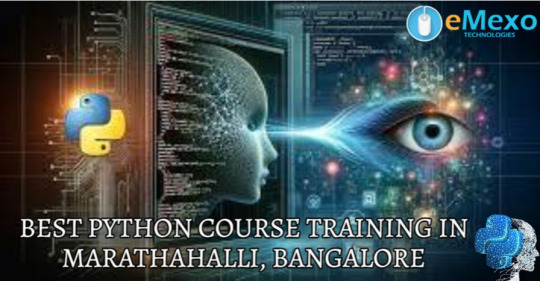
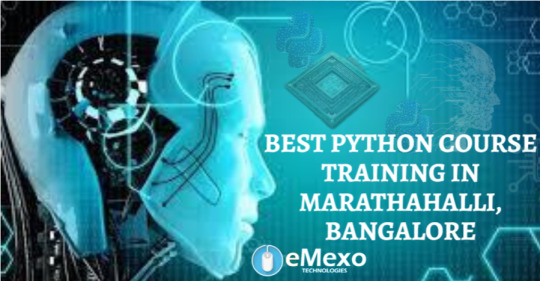




youtube
Want to master Python programming and build a successful IT career? Join eMexo Technologies for the Best Python Training in Marathahalli, Bangalore – your path to becoming a skilled Python developer with job-ready skills and industry certification.
Our Python Certification Course in Marathahalli, Bangalore is designed to equip you with in-demand programming skills, whether you're a beginner or an experienced professional. With real-time projects, hands-on exercises, and expert mentorship, you’ll gain the confidence to build real-world applications and secure your dream job.
🌟 Who Should Join Our Python Course in Marathahalli, Bangalore?
This Python Course in Marathahalli, Bangalore is ideal for:
Students and freshers looking to start their programming career
Software developers and IT professionals upskilling in Python
Data analysts and automation testers using Python for scripting
Anyone looking to crack technical interviews or get Python certified
📘 What You’ll Learn in Our Python Certification Course Marathahalli, Bangalore:
Core Python Programming: Variables, data types, loops, functions, OOP concepts
Advanced Python Concepts: File handling, exception handling, modules, decorators
Web Development with Python: Introduction to Django/Flask frameworks
Database Integration: Using Python with MySQL and SQLite
Automation & Scripting: Build scripts for real-time problem-solving
Live Projects: Real-world applications like calculators, dashboards, and web apps
🚀 Why Choose eMexo Technologies for Python Training in Marathahalli, Bangalore?
We are more than just a Python Training Center in Marathahalli, Bangalore – we are your learning partner. Our focus is on providing career-oriented Python training through certified instructors, hands-on practice, and real-time case studies.
What Makes Us the Best Python Training Institute in Marathahalli, Bangalore:
✅ Industry-expert trainers with real-world Python experience ✅ Fully-equipped classrooms and interactive online sessions ✅ 100% practical-oriented training with live project support ✅ Personalized career guidance, resume building & mock interviews ✅ Dedicated Python training placement in Marathahalli, Bangalore
📅 Upcoming Python Training Batch Details:
Start Date: July 1st, 2025
Time: 10:00 AM IST
Location: eMexo Technologies, Marathahalli, Bangalore
Mode: Both Classroom & Online Training Available
👥 Who Can Benefit from This Python Training Marathahalli, Bangalore?
Students & fresh graduates planning to enter the IT sector
Working professionals aiming to switch to Python development
Testers, analysts, and engineers looking to automate workflows
Anyone passionate about coding and application development
🎯 Get Certified. Get Placed. Get Ahead.
Join the top-rated Python Training Institute in Marathahalli, Bangalore and open doors to careers in software development, automation, web development, and data science.
📞 Call or WhatsApp: +91-9513216462 📧 Email: [email protected] 🌐 Website: https://www.emexotechnologies.com/courses/python-training-in-marathahalli-bangalore/
🚀 Limited Seats Available – Enroll Today and Start Your Python Journey!
🔖 Hashtags:
#PythonTrainingInMarathahalliBangalore#PythonCertificationCourseInMarathahalliBangalore#PythonCourseInMarathahalliBangalore#PythonTrainingCenterInMarathahalliBangalore#PythonTrainingInstituteInMarathahalliBangalore#eMexoTechnologies#PythonProjects#PythonTrainingPlacementInMarathahalliBangalore#ITTrainingBangalore#PythonJobs#BestPythonTrainingInstituteInMarathahalliBangalore#LearnPython#PythonProgramming#PythonForBeginners#Youtube
2 notes
·
View notes
Text
Python Basics for Students and Career Switchers in Tech

In today’s fast-paced digital world, learning to code is no longer limited to computer science graduates or seasoned developers. Whether you're a student aiming to future-proof your career or someone considering a career switch into the tech industry, starting with Python is one of the smartest choices you can make. The fundamental of python are simple enough for beginners yet powerful enough for professional development across various industries.
Python is widely known for its readability, flexibility, and widespread usage in everything from web development to artificial intelligence. Its simplicity makes it an ideal first programming language for absolute beginners and a great refresher for those coming from non-technical backgrounds.
Why Choose Python as a First Language?
Python’s design philosophy emphasizes code readability and simplicity. Unlike many programming languages, Python uses plain English syntax that makes it easier to learn and understand. You won’t need to memorize complex syntax or confusing characters to write functional code.
Additionally, Python has a vast and supportive community. That means if you ever get stuck, you’ll likely find a solution online quickly. Whether it's a bug in your code or help with understanding a concept, forums like Stack Overflow and GitHub are full of solutions.
What Are the Fundamentals of Python?
Before diving into advanced topics like machine learning or web development, you need to build a strong base. Here are the essential fundamental of python concepts every beginner should master:
1. Variables and Data Types
Understanding how to store and manipulate data is the first step in programming. In Python, you can work with:
Integers (int)
Floating-point numbers (float)
Strings (str)
Booleans (bool)
Lists, tuples, and dictionaries
Python doesn’t require you to declare the data type; it detects the type automatically, making your first coding steps easier.
2. Operators and Expressions
Python includes basic arithmetic operators (+, -, *, /), as well as comparison operators (==, !=, >, <) and logical operators (and, or, not).
These operators help you perform calculations and build logic into your programs.
3. Control Structures
To make decisions and repeat actions, you’ll need:
if, elif, and else statements
for and while loops
Mastering control structures allows you to write dynamic programs that can handle a variety of tasks.
4. Functions
Functions are blocks of code designed to perform a specific task. They make your code more modular and reusable.
def greet(name):
print(f"Hello, {name}!")
5. File Handling
Python makes it easy to read from and write to files—an essential skill if you're working with data or saving information.
with open("data.txt", "r") as file:
content = file.read()
6. Error Handling
Learning to handle errors gracefully using try, except, and finally blocks is important for building reliable software.
Who Should Learn Python?
✅ Students
If you’re a student—especially in high school or college—Python can open doors to future careers in data science, software development, and automation. Many universities now include Python in their curriculum because of its real-world applications.
✅ Career Switchers
If you’re moving from a non-tech field like teaching, marketing, or finance, Python is a beginner-friendly language that helps you get up to speed quickly. It’s commonly used in industries like fintech, health tech, and e-commerce.
✅ Freelancers and Creatives
Python isn’t just for techies. Artists and writers use it to create tools, automate tasks, and even work with AI to generate content.
Practical Applications of Python
Learning Python basics can help you move on to a wide range of specialized areas:
Web Development: Using frameworks like Flask or Django
Data Analysis: With libraries like Pandas and NumPy
Machine Learning: With TensorFlow, scikit-learn, and Keras
Automation: For automating repetitive tasks using simple scripts
Cybersecurity: For scripting and automating security tools
With just the basics, you can already build simple calculators, to-do lists, and automation tools that help in daily tasks.
Tools You Need to Start Learning
You don’t need a fancy setup to get started with Python. All you need is:
A computer with internet access
Python (available for free from the official site)
A code editor like VS Code or PyCharm
Access to online tutorials, YouTube videos, or Python programming courses
You can also practice directly in your browser using platforms like Replit, Jupyter Notebooks, or Google Colab.
Tips to Learn Python Effectively
Practice Daily – Coding is a skill; the more you practice, the better you get.
Build Small Projects – Apply what you learn to real-life mini projects.
Join Communities – Engage in forums or join coding groups to stay motivated.
Follow a Curriculum – Choose a structured learning path or course.
Track Your Progress – Keep a journal or use GitHub to track your code over time.
Final Thoughts
Python is an incredibly versatile language that offers endless possibilities for students and career changers alike. Whether you're trying to land a job in tech or looking to automate tasks in your current role, learning the fundamental of python is the first step toward building your confidence and capabilities in coding.
Start today. All you need is curiosity, consistency, and a willingness to learn. Python is ready to take you wherever you want to go in the world of tech.
#LearnToCode#TechCareers#CodingForBeginners#ProgrammingLife#PythonBasics#PythonProgramming#PythonForBeginners#PythonLearning#FundamentalOfPython#StudentsWhoCode#CareerSwitch#Upskill#TechForEveryone
0 notes
Text
Beginner’s guide to learning Python in 2025 with tips, projects & local classes in Ahmedabad to boost your programming journey.
0 notes
Text
Studying code calmly and avoiding a burnout. Day 3
(29/06/2023)
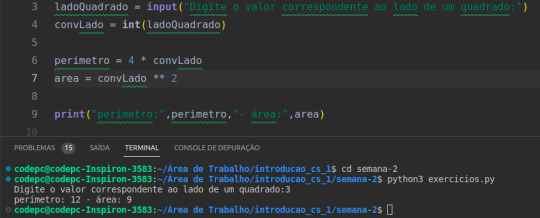
Hi everyone. how are you?
Here we are progressing.
Yesterday I didn't study code because I spent my day editing linkedin, sending requests and interacting with the women in my connection.
As I finally made my brain understand that networking is part of things to study and do to get a job, I slept tired but with a feeling of achievement and not of waste.
*Tired because I'm introverted and maybe autistic, so many interactions / conversations with strangers take a lot of energy.if it's with someone I know, it also demands me, but it takes longer for me to get worn out.
Today I started my introductory computer science course and this print comes from one of the exercises on the list.
7 modules to go and I'm doing well.
Maybe and probably I'll stay overnight because tomorrow I have to start part 2 of this course.
I'm not anxious because I have until Sunday to finish everything, but I want to finish my courses no later than Saturday at 18:00.
So we are doing well in the mission to study and avoid a burnout EUEUUHEHUE
Finally I wanted to give a final addendum that I laughed so hard with your @fishking reblog. This is my kind of humor and you are 100% right about "glimpse of a ruined mind" HUEHUEHHEHUEHUEEUEU.
Thanks for the laughs and since you wanted to read another diary, here it is.
Coming back, as far as possible, I wish you all to be well and if you are not, that you get well soon and manage to win your battles to get where you want to be.
Remember ,"WIN IN THE FORCE OF HATE IF NECESSARY" EHUHEUEEU
Have a great Friday and drink water.
#womanintech#codeblr#software development#woman in stem#studyblog#coding#studyblr#software engineering#code#algorithms#pythonforbeginners#python#pythoncode#pythonprogramming#100 days of code#learn to code#progblr
17 notes
·
View notes
Text
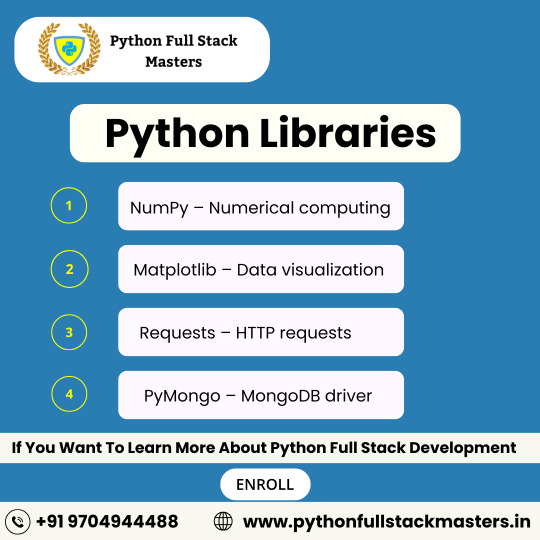
📚 Top Python Libraries You Must Know!
Master the essential Python libraries every developer uses:
✅ NumPy – For powerful numerical computing ✅ Matplotlib – For beautiful data visualizations ✅ Requests – To handle HTTP requests easily ✅ PyMongo – Interact with MongoDB seamlessly
👉 Ready to become a Python Full Stack Developer?
📞 +91 9704944488 🌐 www.pythonfullstackmasters.in 📍 Location: Hyderabad, Telangana
#Python#PythonProgramming#LearnPython#PythonCourse#PythonForBeginners#PythonCommunity#PyMongo#MongoDBWithPython#FullStackDeveloper#TechSkills#TechEducation#CodingLife#ProgrammingJourney#OnlineLearning
0 notes
Text
What Are Lists, Tuples, and Dictionaries in Python? Explained with Examples
When you're learning Python, one of the first concepts you'll encounter is data structures. Among the most used ones are lists, tuples, and dictionaries. These are powerful tools that help organize and manage data effectively. Here’s a beginner-friendly breakdown with examples.
📋 What is a List in Python?
A list is a collection of items that is ordered, mutable, and allows duplicate values. You can add, remove, or change elements.
Example:
python
fruits = ["apple", "banana", "cherry"] fruits.append("orange") print(fruits) # Output: ['apple', 'banana', 'cherry', 'orange']
🔒 What is a Tuple in Python?
A tuple is similar to a list but immutable — meaning you can't change its values after creation. It’s used when you want to ensure data remains constant.
Example:
python
coordinates = (10.5, 20.3) print(coordinates[0]) # Output: 10.5
🔑 What is a Dictionary in Python?
A dictionary stores data in key-value pairs, allowing fast lookups and structured storage. It’s unordered (prior to Python 3.7), changeable, and doesn't allow duplicate keys.
Example:
student = {"name": "Alice", "age": 22, "major": "CS"} print(student["name"]) # Output: Alice
🧠 When to Use Each?
Use lists when you have an ordered collection of items that may change.
Use tuples when you want a fixed, ordered set of data.
Use dictionaries when you need to associate values with unique keys for quick lookup.
🆘 Need Help Understanding These Structures?
If you’re stuck with assignments involving Python lists, tuples, or dictionaries, don’t worry. Visit AllHomeworkAssignments.com to get expert help and personalized guidance tailored for students.
#PythonDataStructures#PythonLists#LearnPython2025#AllHomeworkAssignments#TuplesInPython#DictionariesExplained#PythonForBeginners
0 notes
Text
Most Common Python Interview Questions and Answers (2025 Edition)

Python remains one of the most in-demand programming languages in today’s job market, powering everything from web apps to AI and data science. If you're preparing for a technical interview, mastering the most asked Python interview questions can give you a clear edge.
In this blog, we’ll cover key Python concepts, sample questions, and simple explanations to help you prepare with confidence.
📘 Want a complete list with detailed answers? 👉 Check out the full guide: Python Interview Questions – Freshy Blog
🔹 Basic Python Interview Questions
1. What is Python?
Python is an interpreted, high-level, general-purpose programming language known for its simplicity and readability.
2. What are Python’s key features?
Interpreted and dynamically typed
Easy to learn syntax
Object-Oriented
Extensive standard libraries
Great for automation, AI, web development
3. What is the difference between a list and a tuple?
List: Mutable, can be changed after creation
Tuple: Immutable, cannot be changed after creation
🔸 Intermediate Python Interview Questions
4. What is the difference between is and ==?
is: Checks object identity
==: Checks value equality
5. What are Python decorators?
Decorators are functions that modify the behavior of another function without changing its code.
def decorator_func(func):
def wrapper():
print("Before function")
func()
print("After function")
return wrapper
🔹 Advanced Python Interview Questions
6. What is a generator in Python?
A generator is a function that returns an iterator and generates values on the fly using the yield keyword.
7. Explain Python’s Global Interpreter Lock (GIL).
GIL is a mutex in CPython that prevents multiple native threads from executing Python bytecodes at once, affecting multithreading.
🧠 Explore all 50+ Python interview questions with real examples: 👉 https://www.freshyblog.com/python-interview-questions/
✅ Interview Preparation Tips
Practice coding problems daily
Focus on OOPs, error handling, and Pythonic code
Work on real projects and contribute to open-source
Be ready to explain your thought process during interviews
Final Thoughts
Whether you're interviewing for a junior developer role or a senior Python engineer, knowing these Python interview questions will help you stand out. Python’s versatility makes it a go-to skill across industries—so prepare well and stay confident.
📘 Full guide with all the top questions and answers: 👉 https://www.freshyblog.com/python-interview-questions/
#PythonInterviewQuestions #PythonJobs #TechInterviews #PythonForBeginners #PythonDeveloper #InterviewPreparation #CodeWithPython #FreshyBlog #LearnToCode #PythonCoding
#PythonInterviewQuestions#PythonJobs#TechInterviews#PythonForBeginners#PythonDeveloper#InterviewPreparation#CodeWithPython#FreshyBlog#LearnToCode#PythonCoding#python#technology#tech
0 notes